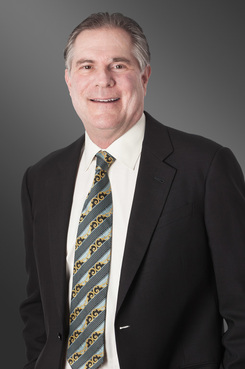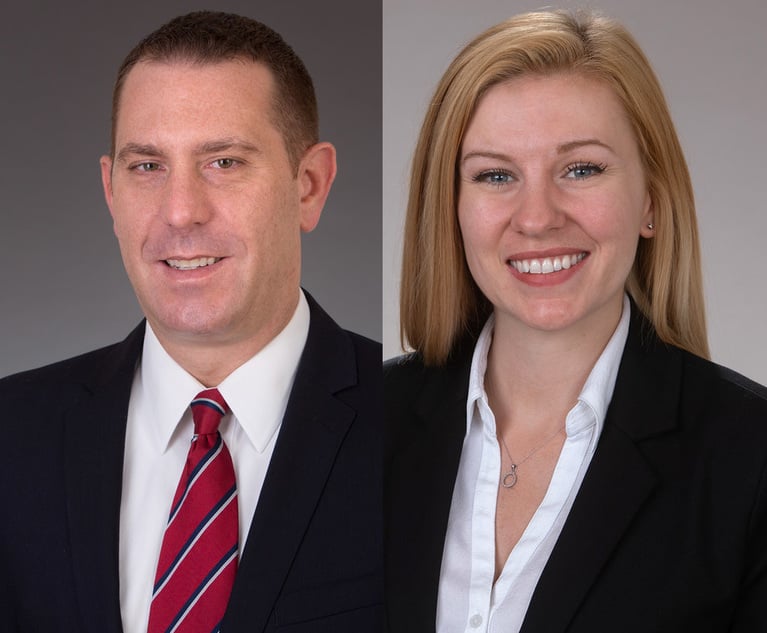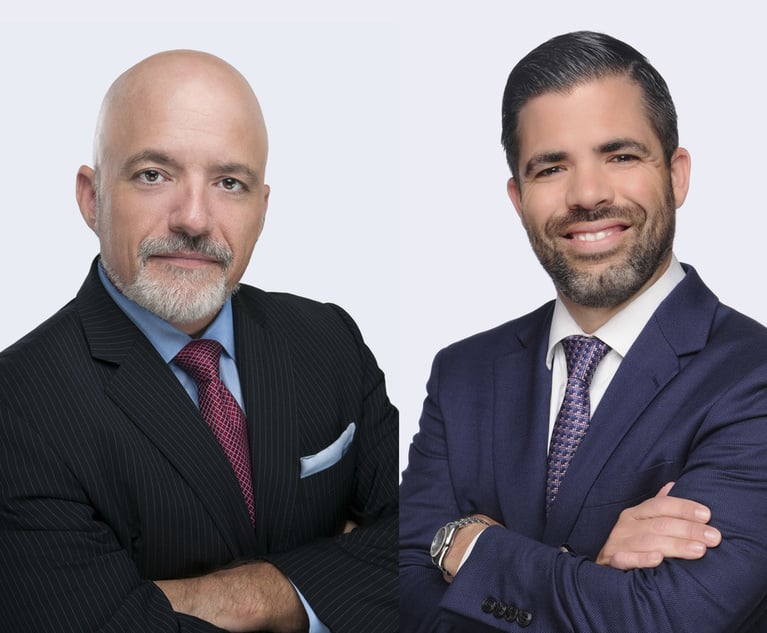Think Twice Before Converting a Florida Business to a Corporation
The Tax Cuts and Jobs Act taken together have many business owners considering converting their business from a pass-through entity to a C corporation in order to take advantage of the 21-percent tax rate for corporations.
March 07, 2018 at 10:00 AM
5 minute read

The Tax Cuts and Jobs Act taken together have many business owners considering converting their business from a pass-through entity to a C corporation in order to take advantage of the 21-percent tax rate for corporations. Although there are several reasons not to convert to a C corporation, the owner of a Florida business would likely suffer an additional detriment by doing so due to state tax laws.
A C corporation is a corporation which has not made a subchapter S election. A “C” corporation pays income taxes itself, at the new reduced 21-percent tax rate. On the other hand, the owners of businesses structured as a pass-through entity—either an S corporation, partnership, LLC or sole proprietorship—pay tax on their share of the company's income at the higher tax rate for individuals—up to a top tax bracket of 37 percent under the new tax law.
However, there are material tax disadvantages to converting to a C corporation. Significantly, there is a double tax on a business structured as a C corporation—first at the corporation level, which will pay tax at the 21-percent rate on its profit, and then a second tax when the corporation distributes the profits as dividends, which are generally taxed to the shareholders at a 23.8 percent rate. This results in a total combined corporation and shareholder tax rate (for a shareholder in the top tax bracket) of about 39.8 percent. If the business is a pass-through entity, which passes the income through to its owners, the owner's top tax rate would be 37 percent, and most small business owners would be in a tax bracket lower than that. When the double tax is taken into consideration, there is a disadvantage to converting a business to a C corporation to take advantage of the 21-percent tax rate. There are other disadvantages as well, including a potential tax cost for some businesses in cases where the amount of the company's debt exceeds the tax basis of its assets, potential transfer taxes, and accumulated earnings tax concerns.
For the owners of a pass-through business operated in Florida, there is a significant additional disadvantage to converting to a C corporation. In Florida, only a C corporation is subject to state income tax. There is no personal income tax on income passing through to the owners, and no separate entity level tax on the pass-through business. Converting a Florida business to a C corporation would add an additional 5 percent tax on the profits, which would otherwise not be subject to Florida tax at all if the business remains structured as a pass-through entity. This would have the effect of a combined federal and state tax rate on the earnings of the corporation of about 25 percent (because the Florida tax would be deductible by the corporation when calculating its federal income tax, the tax rate is less than the 21 percent federal tax, plus the 5 percent Florida tax rate). As a result of the increased combined federal and state tax rate due to the 5 percent Florida tax, the total double tax for an owner in the top tax rate would be nearly 43 percent, instead of the 37 percent top rate for a business structure as a pass-through entity. If the business qualifies for the new 20 percent deduction for pass-through entities, this would result in a total tax to the owner as low as 29.6 percent, further widening the gap.
This would not be a consideration for a pass-through business in a state which imposes a personal income tax, because the owner of a pass-through business would pay tax on the income earned by the business. This is not the case in Florida.
Florida is unique, even among other states which do not impose a personal income tax. Texas, Washington and Nevada do not impose a personal income tax, but they do impose a franchise or gross receipts tax at the entity level of most businesses, including pass-through entities, as well as corporations. Therefore, business owners in those states do not face the same significant disadvantage of converting to a C corporation as Florida business owners.
The decision to convert a business to a C corporation should be made after careful consultation with tax advisers and weighing the pros and cons. But for many businesses, the disadvantage to a Florida business structured as a C corporation would result in the decision to remain as a pass-through entity.
Marvin A. Kirsner is the administrative shareholder of Greenberg Traurig's Boca Raton office, where his primary areas of practice deal with corporate, transactional and industry specific tax issues. He serves as the co-chair of the firm's state and local tax practice.
This content has been archived. It is available through our partners, LexisNexis® and Bloomberg Law.
To view this content, please continue to their sites.
Not a Lexis Subscriber?
Subscribe Now
Not a Bloomberg Law Subscriber?
Subscribe Now
NOT FOR REPRINT
© 2025 ALM Global, LLC, All Rights Reserved. Request academic re-use from www.copyright.com. All other uses, submit a request to [email protected]. For more information visit Asset & Logo Licensing.
You Might Like
View All
Trending Issues in Florida Construction Law That Attorneys Need to Be Aware Of
6 minute read


Trending Stories
- 1AIAs: A Look At the Future of AI-Related Contracts
- 2Litigators of the Week: A $630M Antitrust Settlement for Automotive Software Vendors—$140M More Than Alleged Overcharges
- 3Litigator of the Week Runners-Up and Shout-Outs
- 4Linklaters Hires Four Partners From Patterson Belknap
- 5Law Firms Expand Scope of Immigration Expertise Amid Blitz of Trump Orders
Who Got The Work
J. Brugh Lower of Gibbons has entered an appearance for industrial equipment supplier Devco Corporation in a pending trademark infringement lawsuit. The suit, accusing the defendant of selling knock-off Graco products, was filed Dec. 18 in New Jersey District Court by Rivkin Radler on behalf of Graco Inc. and Graco Minnesota. The case, assigned to U.S. District Judge Zahid N. Quraishi, is 3:24-cv-11294, Graco Inc. et al v. Devco Corporation.
Who Got The Work
Rebecca Maller-Stein and Kent A. Yalowitz of Arnold & Porter Kaye Scholer have entered their appearances for Hanaco Venture Capital and its executives, Lior Prosor and David Frankel, in a pending securities lawsuit. The action, filed on Dec. 24 in New York Southern District Court by Zell, Aron & Co. on behalf of Goldeneye Advisors, accuses the defendants of negligently and fraudulently managing the plaintiff's $1 million investment. The case, assigned to U.S. District Judge Vernon S. Broderick, is 1:24-cv-09918, Goldeneye Advisors, LLC v. Hanaco Venture Capital, Ltd. et al.
Who Got The Work
Attorneys from A&O Shearman has stepped in as defense counsel for Toronto-Dominion Bank and other defendants in a pending securities class action. The suit, filed Dec. 11 in New York Southern District Court by Bleichmar Fonti & Auld, accuses the defendants of concealing the bank's 'pervasive' deficiencies in regards to its compliance with the Bank Secrecy Act and the quality of its anti-money laundering controls. The case, assigned to U.S. District Judge Arun Subramanian, is 1:24-cv-09445, Gonzalez v. The Toronto-Dominion Bank et al.
Who Got The Work
Crown Castle International, a Pennsylvania company providing shared communications infrastructure, has turned to Luke D. Wolf of Gordon Rees Scully Mansukhani to fend off a pending breach-of-contract lawsuit. The court action, filed Nov. 25 in Michigan Eastern District Court by Hooper Hathaway PC on behalf of The Town Residences LLC, accuses Crown Castle of failing to transfer approximately $30,000 in utility payments from T-Mobile in breach of a roof-top lease and assignment agreement. The case, assigned to U.S. District Judge Susan K. Declercq, is 2:24-cv-13131, The Town Residences LLC v. T-Mobile US, Inc. et al.
Who Got The Work
Wilfred P. Coronato and Daniel M. Schwartz of McCarter & English have stepped in as defense counsel to Electrolux Home Products Inc. in a pending product liability lawsuit. The court action, filed Nov. 26 in New York Eastern District Court by Poulos Lopiccolo PC and Nagel Rice LLP on behalf of David Stern, alleges that the defendant's refrigerators’ drawers and shelving repeatedly break and fall apart within months after purchase. The case, assigned to U.S. District Judge Joan M. Azrack, is 2:24-cv-08204, Stern v. Electrolux Home Products, Inc.
Featured Firms
Law Offices of Gary Martin Hays & Associates, P.C.
(470) 294-1674
Law Offices of Mark E. Salomone
(857) 444-6468
Smith & Hassler
(713) 739-1250






